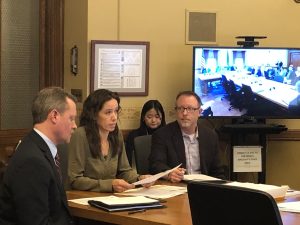After some delay and gridlock, the Wisconsin State Legislature’s budget-writing Joint Committee on Finance met on Friday, June 27 to complete its work on the 2025-27 biennial budget. Since February, Clean Wisconsin worked with our partners at the Wisconsin Dairy Business Association, The Wisconsin Land and Water Conservation Association and The Nature Conservancy to advocate for new and increased funding for programs that help farmers improve water quality in rural areas. In response to our advocacy, the Joint Committee on Finance committed over $16 million in new funding to innovative and environmentally-minded agricultural programs.
Clean Wisconsin worked with legislators to provide new funding for the Producer-led Watershed Protection Grant Program, the Nitrogen Optimization Program, and the Crop Insurance Premium Rebate for Planting Cover Crops Program at the Department of Agriculture, Trade and Consumer Protection.
The Producer-led Watershed Protection Grant Program helps farmers in watersheds and adjacent watersheds form groups, experiment with implementing different conservation farming practices and learn from each other on challenges, successes and outcomes. The program facilitates farmer-to-farmer information sharing on practices that improve water quality. Through our efforts, the Joint Finance Committee increased funding for the program by 33%.

The Nitrogen Optimization Program provides funding for farmers to develop innovative practices to apply commercial nitrogen and work with the University of Wisconsin System to study the effects of different practices. The program is intended to identify the optimal level of nitrogen for a given agricultural field that will enhance crop yields without allowing for excess surface and groundwater pollution. The committee provided $2 million to the program.
The Crop Insurance Premium Rebate for Planting Cover Crops Program provides farmers with a $5 rebate on summer crop insurance premiums for each acre planted with cover crops, which provide significant water quality benefits. Cover crops reduce runoff and erosion and enhance water retention and infiltration. Once again, in response to our work, the committee invested $1.6 million in the program.
With our partners at the Wisconsin Land and Water Conservation Association, Clean Wisconsin also advocated for increased investment in county conservation staffing. All 72 counties in the state employ land and water conservationists, who work directly with farmers and private landowners to provide educational, technical, and conservation assistance, protect water quality, control erosion and improve soil quality, among other vital initiatives. As local community members themselves, county conservation staff are some of the most trusted advisors to the farmers and landowners. While local county revenue finances county conservation staff, there is a state statutory requirement for the state to provide a certain level of funding as well. The state has fallen short of that requirement for several budget cycles, but this year the committee provided over $12 million in new funding, significantly raising the state’s share of cost.
Clean Wisconsin, the Dairy Business Association, Wisconsin Land and Water Conservation Association and The Nature Conservancy spent many long days in the State Capitol over the past five months advocating for these investments and working closely with key legislators. We’re encouraged by the bipartisan support for farmers and clean water, but there is more work to do. We look forward to continuing our work to create a new Transition to Grazing Program that will provide another opportunity for farmers to implement a meaningful conservation practice. The bipartisan Transition to Grazing Bill has received public hearings in both the Senate and Assembly Agriculture Committees, and it recently passed the Assembly committee on an overwhelming 13-1 vote.
Now that the committee has completed its work, the budget bill heads to the floors of both houses and eventually to the governor’s desk for his signature or veto. Clean Wisconsin and our partners will diligently work to ensure these investments are maintained throughout the rest of the process.

